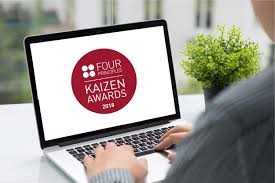Four Principles ‘Lean’ consultancy enjoys full-fat growth
It is two years since Lean Management consultancy, Four Principles, established a joint venture with Abdul Latif Jameel to spread the ‘Lean philosophy’ across the Middle East, North Africa and Turkey (or MENAT) region and help businesses leverage the opportunities it can deliver.
 Lean Management is based on the ‘kaizen’ business philosophy pioneered by Japanese corporations like Toyota to boost efficiency and performance, eliminate waste and optimize the use of resources.
Lean Management is based on the ‘kaizen’ business philosophy pioneered by Japanese corporations like Toyota to boost efficiency and performance, eliminate waste and optimize the use of resources.
Abdul Latif Jameel first adopted the kaizen culture when it began importing Toyota vehicles from Japan to Saudi Arabia nearly 65 years ago as the exclusive distributor. It has since experienced at first-hand how Lean Management can ensure a business is strong enough to adapt and evolve in changing environments.
 The investment in Four Principles reflects this long-standing relationship with Japan and follows the Saudi-Japan Vision 2030 Agreement to have closer ties between the two countries.
The investment in Four Principles reflects this long-standing relationship with Japan and follows the Saudi-Japan Vision 2030 Agreement to have closer ties between the two countries.
Mohammed Abdul Latif Jameel KBE, Chairman and Chief Executive Officer of Abdul Latif Jameel, said: “As the government of Saudi Arabia gets its economic diversification strategy underway as part of the Vision 2030 plan, the kaizen philosophy can support in streamlining performances across a wide range of fields in both the private and public sectors, while playing a key role in improving output.”
In line with these objectives, the joint venture with Four Principles aims to inspire economic growth across Saudi Arabia and much further across the wider region over the coming years, on both a micro and macro level.
We caught up with Seif Shieshakly (SS) and Patrick Wiebusch (PW), the co-founders of Four Principles, to review progress over the past two years and discuss their vision for the future.
How has Four Principles developed since establishing the joint venture with Abdul Latif Jameel in 2017?
PW: It’s been very positive. Annual revenue increased 115% and the headcount has increased by 54% – we’ll have 30 people working for us by the end of 2019. These figures are strong, especially compared to market growth in the rest of the GCC consulting market, which is between 7% and 10%.
What was the rationale behind opening your office in Riyadh?
SS: Saudi Arabia has always been our main market – and it still is. It made sense for us to open in Dubai initially, while we got the business firmly established. We can service clients all over the region from Dubai. But as we’ve grown and developed, it became clearer that the time was right for a permanent presence in Saudi Arabia, where we could be closer to clients on the ground. So, we opened the Riyadh office in December 2018.
How has the joint venture with Abdul Latif Jameel helped the business in Saudi Arabia?
PW: Our association with the Abdul Latif Jameel brand reassures potential clients. In the early days of Four Principles, we were only able to grow by word-of-mouth from existing clients, which can be hit-and-miss. The joint venture with Abdul Latif Jameel, on the other hand, gives us access to the entire Abdul Latif Jameel internal and external network. It has helped us get noticed and strengthened our credibility, particularly in the public sector, where previously we were, perhaps, seen as being too small to be taken seriously.
How much does Four Principles’ success reflect the growing recognition of Lean among businesses in the region?

PW: When we started 10 years ago, we had to do a lot of work to educate the market about what Lean was, and how it could transform businesses. That’s changed now. Nobody asks, ‘what is Lean?’ anymore. People know what it is and the benefits it can deliver.
There are still misconceptions, but they are not specific to this region, we come across similar issues all around the world. People often think that having a single ‘Lean expert’ on their team, for example, will allow them to instantly turn around the fortunes of an organization with 15,000 people in it. Of course, it won’t, but awareness of this is increasing.
Or there is a mistaken belief that Lean is some kind of toolkit rather than a mindset. Potential clients often say, ‘I’ll buy the tools – just send me someone to teach me how to use them’. So, we sometimes still have to explain that the potential benefits of Lean are much bigger if you regard it as a way of changing mindsets, rather than merely changing processes.
You’ve worked with big clients like Ikea over the past 12 months. Are the challenges in large companies the same as ones you encounter in smaller businesses?
SS: Yes, they are, but on a large scale. Big companies like IKEA and McDonalds have global standards for their franchises around the world. Where we add value is by helping to adapt these standards to the local culture. We help these kinds of companies understand local expectations, and even local definitions of value and waste, which the global standards do not cover.
And Saudi Arabia is a very big and diverse market. Customer behavior in Jeddah is very different to that in Riyadh, for example. So even within Saudi Arabia itself, we have to do some fine tuning in terms of establishing what Lean means in that context.
You have also been working with Nesma Embroidery, helping to create jobs and boost employment. Can you tell us about that?
Nesma Embroidery began as a CSR project of Nesma Holdings, which is a large diversified group of businesses operating across Saudi Arabia and the MENAT region. It was largely for disabled, mainly deaf women, outside of the main cities, allowing them to earn a dignified living by working in embroidery. It has been operating very successfully, but the senior management saw an opportunity to move beyond that definition to become a professional business.
We helped them increase productivity and reduce lead times, so they can compete on quality, as an alternative to companies importing containers of textiles from China or Bangladesh, for example.
Now the new business model has been proven, it can be scaled. We’ve had interest from regional governors in Saudi Arabia who are keen to take the Nesma Embroidery model into their regions, because it creates jobs, particularly for women who, in line with recent reforms, are joining the workforce in increasing numbers.
You have a Kaizen Lab at your offices in Riyadh. What happens there?
PW: The Kaizen Lab serves as a knowledge hub that we use to start the transformations in mindset of our clients. It’s where we deliver cutting-edge digital training and certification to the public and private sector. The objective is to train people by using real-life simulations of Lean to identify the kind of Lean strategies that could apply to their own organizations.
Right from the outset, it was part of our vision to set up a Kaizen Lab to help educate and train people in the Lean philosophy. We’ve partnered with digital education leaders from the US and Germany, as well as artificial intelligence and data mining service providers, to address the digital transformation needs of Saudi companies.
We facilitate these digital transformations at the Lab with training, simulations, case studies and factory visits. We show clients best-case digital or “Industry 4.0” implementations in similar factories and help them create a vision they can implement in their own company.
What role does data and technology play in these digital transformations?
PW: They are at the very heart of it. For example, if you have a fleet of delivery vans that take products to wholesalers and some of them are regularly returning with unsold stock, you need to know where the vans are driving, the load factors, the routes they take, the product types they’re carrying, and so on.
Previously, you’d have to go out on the road with the driver, observe, do manual data analysis. But this wouldn’t really help you with country-wide problems, with hundreds of vans all over the country. Data mining allows you to identify patterns and optimize, for example, this route to market or that logistics network, quickly and at a regional or national scale. This kind of capability and speed will help companies improve much more rapidly than before.
The way we look at it, if Taiichi Ohno, the father of the Toyota Way, was alive, and he wanted to reinvent the Toyota Way with the technology available today, what would it look like? Would he still use kanbans written by hand on big boards, or would he use a digital dashboard to keep KPIs linked to your data sources and your ERP systems? Would he be looking at how six people could combine their strength to carry a part, or would he look at what kind of robot could make it easier and more economical?
A Lean transformation must deploy the technology that is available today. We help clients to do that. Of course, it must be appropriate to their business and their environment. If a client is facing challenges with the business basics, you have to start at that level before you start talking about digital transformation. You don’t go from zero to hero in one night. That’s not how it works.
We’re coming up to the second year of the Kaizen Awards. What’s the standard been like this year?
 SS: There’s more awareness and more applications than last year, which is fantastic. The Kaizen Awards are all about building awareness, providing Lean organizations with more exposure, and celebrating their achievements.
SS: There’s more awareness and more applications than last year, which is fantastic. The Kaizen Awards are all about building awareness, providing Lean organizations with more exposure, and celebrating their achievements.
One really important element is the idea of bringing together the Lean community in Saudi Arabia, introducing companies from different industries to each other, with everyone sharing their success stories and everyone benefitting from a broader understanding of how Lean works in different sectors.
Hospitals share their experience with car rental companies, who share their experience with manufacturing companies – because none of them are competitors. This is powerful stuff, with the potential to elevate the whole Saudi Lean community to another level. We are very honored to provide a platform where these companies can engage, exchange and grow together.

What are the biggest challenges for businesses in the Middle East, and what role can Lean play in responding to these challenges?
SS: Ultimately, this is about a mindset change, and that change starts and ends with the leaders of the organization.
PW: In Saudi Arabia, one of the biggest challenges is bringing young people into jobs quickly; to empower, motivate and educate the younger generation. We believe Lean brings solutions that enable you to push the boundaries, to develop young people, train them quickly, and allow them to generate value.
SS: We’re working with Abdul Latif Jameel Finance, for example. We’re helping to hire, train, and coach a team of young Saudi graduates – half of them women – in the Lean approach, so that using Lean tools and Lean thinking becomes second nature as we implement the strategic transformation of Abdul Latif Jameel Finance. We’ve been doing this for almost a year and the scheme has already delivered millions of dollars in savings.

What are your ambitions for Four Principles over the next few years?
PW: We have strong growth ambitions. Our headcount will grow to 45 people and we’re looking for growth in both revenue and profit. There’s a window of opportunity. The market is strong, there’s a big demand for our service offering, and, thanks to the financial strength of Abdul Latif Jameel, we intend to seize the opportunity and grow.
SS: We’ll be recruiting heavily in Saudi Arabia itself. We had our first careers fair at the King Fahd University of Petroleum and Minerals in the Eastern Province in December, and plan to have a presence at careers fairs in other advanced universities across the country. Hiring locally means that we can develop our next-generation consultants within the region, rather than bringing them in from overseas – and that is a very exciting prospect, as Saudi Arabia continues to develop in line with the ambitions of Vision 2030.





 1x
1x

 Added to press kit
Added to press kit


